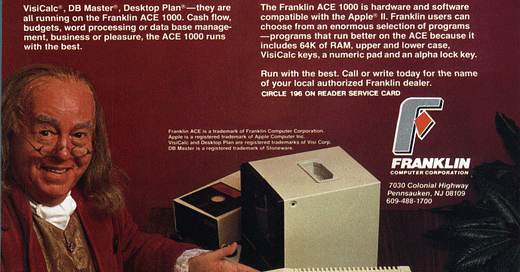Ah! Remember the good old days before software copyright laws? Franklin does.
What Was the Franklin ACE 1000?
When the Apple II was released in June of 1977, it was a hit with hobbyists and other consumers. By the time Apple ended production in 1993, between 5 and 6 million Apple IIs had been made. This popularity led to a number of Apple clones being produced. Barry Borden, Russell Bower, and Joel Shusterman founded the Franklin Computer Corporation in 1981 to do just that.

The Franklin ACE 100 was release in early 1982 and copied the Apple II. The Franklin ACE 1000 was released in March and was a copy of the Apple II Plus.
The Franklin ACE 1000 was larger than the Apple product it copied. This allowed it to have a full keyboard. According to a review in Creative Computing’s January 1983 issue, “Inside, extra space is needed for the large power supply and the spacious main circuit board. Extra space on the circuit board means more room between components and between cards in the expansion slots. With more room between parts, cooling is improved and heat related problems are less likely to occur.” (Remember last week’s article about Kensington Microware's System Saver with built-in cooling fan?)
The review’s author had the following to say about the Franklin’s Apple-compatibility, “Operating the Ace 1000 is much like running an Apple II. I remove all the cards from my Apple--except the language card--and inserted them in the Ace 1000. Without exception, all of them worked…To gain further assurance I tried a sampling of software from my collection. Other than the minor problems alluded to above, everything worked."
Unfortunately, the Franklin didn’t copy the Apple’s ability to display color graphics. It was limited to “shades of grey and black and white”. The Franklin was also slightly more expensive at $1,595 vs Apple’s $1,195.
On a side note, the Franklin Ace 1000 made several appearances in popular films. It was seen in the Ghostbusters’ lab in the original 1984 Ghostbusters. You can also see a poster for an ACE 1000 in the background of 1984’s Triumph of the Nerds.
Lawsuit and the Future of Franklin
Unsurprisingly, Apple was not happy about people copying their systems. Franklin went so far as to ship copies of Apple Disk Operating System (DOS). According to Ernie at Tedium, “The reason why it worked so well had much to do with the way that Franklin copied the hardware and software necessary for the ACE 100—it did so wholesale, directly copying the hardware and software of the Apple II in an obvious way, while adding only a handful of minor additional features, such as the ability to create lower-case letters.”
Apple sued Franklin in March of 1983. Initially, the court sided with Franklin, but an appeals court sided with Apple. The case set the stage for how programs would be copyrighted in the future. A January 1984 analysis of the case said:
The Third Circuit’s decision in Apple Computer, Inc. v. Franklin Computer Corporation is significant because it held that all computer programs, whether expressed in object code embedded in ROM or expressed as an operating program, are copyrightable subject matter. Thus, by granting copyright protection to all programs, the Franklin opinion has helped stabilize copyright law in relation to computer software and has allowed copyright to become the most effective, most easily obtainable, and most preferred form of legal protection· for computer programs.
After the lawsuit, Franklin released two more Apple clones that weren’t quite as Apple-compatible as their previous entries: the ACE 500 and ACE 2000. They also started getting into the PC-compatible market. However, constant legal action from Apple forced them to get out of the computer market completely.
Franklin’s next move was to get into the educational handheld market. They released a series of handheld dictionaries and translators. They even released a device filled with recordings of Johnny Cash reading the Bible.
Over the years, Franklin has endured a series of mergers. Today, the website simply says “Temporarily Closed for Renovations” before forwarding you to a nonexistent Amazon store page.
What computer ads would you like to see in the future? Please comment below. If you enjoyed it, please share it with your friends and relatives. Thank you.








